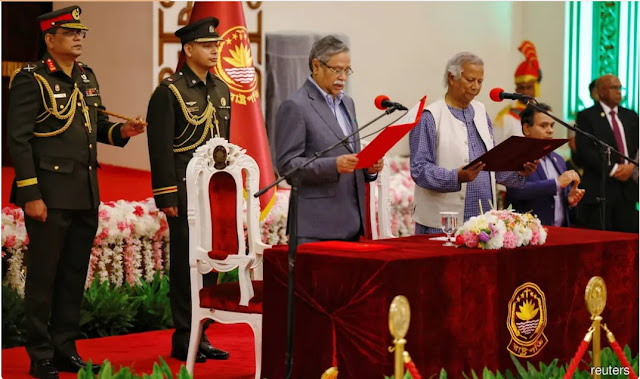Citizen Proposal to Nobel
Laureate Dr. Muhammad Yunus
Chief Advisor to the Interim
Government of Bangladesh
Subject: Proposal for
Formation of a National Security Council for long-term security and political
stability.
Your Excellency!
I am writing to you as a
concerned citizen of Bangladesh, deeply troubled by the current state of
affairs in our beloved nation. The ongoing political unrest, administrative
instability, and social upheaval have created a precarious situation that
demands immediate and decisive action. In this critical moment, your leadership
as the Chief Advisor to the Interim Government offers hope for a more inclusive
and sustainable path forward.
I humbly present to you a
proposal for the formation of a National Security Council (NSC), comprising representatives
from all major political parties and stakeholders. This Council would
function as a national advisory and decision-making body to address the current
crises and lay the foundation for long-term security and political stability.
Proposed Objectives of the National Security Council (NSC):
1. Improving the Law-and-Order
Situation:
The law-and-order situation in the country has deteriorated due to
widespread unrest and the loss of trust in the authorities. The NSC
would be tasked with developing a comprehensive, practical proposal that
outlines immediate steps to restore law and order. This would include:
Unified Policing Strategy: Involving
the participation of all political parties to create a non-partisan policing
strategy that prioritizes public safety over political interests. This could
also include reforms within law enforcement agencies to ensure neutrality,
transparency, and accountability.
Local and National Security
Coordination: Strengthening coordination between local law enforcement
bodies and the central government to ensure consistent enforcement of law and
order across all regions, with a focus on de-escalating conflicts in hot zones.
Community Policing Initiatives:
Promoting community policing models where law enforcement works directly with
community leaders and local representatives to build trust, reduce crime, and
prevent violence at the grassroots level.
2. Addressing Ongoing
Movements and Public Protests:
The recent surge in movements and protests by various professional,
civil, and student groups has been one of the most prominent signs of public
discontent. The NSC could establish a multi-pronged approach to engage
with these groups:
Dialogue Platforms: Create
formal platforms where leaders of professional and civic groups can communicate
their demands directly to the NSC. These platforms would ensure peaceful
dialogue and negotiation as opposed to violent confrontations.
Proposals for Reforms: Based on the
discussions with these groups, the NSC can devise and propose actionable
reforms that address their key concerns, including employment issues, economic
inequalities, and government accountability.
Monitoring and Early Intervention: The NSC
could monitor the progress of ongoing movements and intervene with timely
solutions to prevent protests from escalating into violence. This would allow
the government to proactively manage discontent rather than reacting only when
unrest becomes widespread.
3. Stabilizing Civil
Administration:
The instability within the civil administration has severely hampered
governance, leading to inefficiencies and a loss of public trust. The NSC
would be instrumental in stabilizing the civil administration through:
Comprehensive Administrative
Reforms: Reviewing and implementing a set of administrative reforms aimed
at depoliticizing civil services, ensuring merit-based appointments, and
enhancing transparency in government operations.
Civil Service Accountability:
Establishing a robust system for holding civil servants accountable, ensuring
that they are not influenced by political interests but are focused on serving
the public efficiently.
Restoring Trust in Public
Institutions: Implementing strategies to rebuild the public’s trust in
civil institutions through better service delivery, anti-corruption measures,
and public engagement initiatives.
4. Forming a Regional Security
Organization:
Given Bangladesh’s strategic
position and the increasing geopolitical tensions in South Asia, the formation
of a regional security alliance is crucial to safeguarding the nation’s
security interests. The NSC could spearhead the initiative to form such a regional
organization by:
Collaborative Security
Framework: Proposing the creation of a regional security alliance with neighboring
countries, including China, Pakistan, Sri Lanka, Maldives, Bhutan, and Nepal.
This alliance would focus on mutual defense, intelligence sharing,
counterterrorism efforts, and combating transnational threats such as drug
trafficking and human smuggling.
Economic and Diplomatic
Cooperation: Strengthening regional diplomatic and economic ties to foster
peace and reduce the likelihood of cross-border conflicts. This could include
joint infrastructure projects, trade agreements, and climate action initiatives
that benefit all participating countries.
Military and Strategic
Partnerships: Exploring opportunities for joint military exercises, defence
technology sharing, and disaster management cooperation to ensure that
Bangladesh and its neighbours are better prepared to face common security
threats.
Proposed Structure of the
National Security Council (NSC):
To ensure the effectiveness of
the NSC, it must have a well-defined structure, comprising
representatives from all political parties, civil society, and professional
groups. Below is a suggested structure for the Council:
Chairperson: The Chief
Advisor to the Interim Government (or a nominee of consensus).
Members:
Representatives from all major political parties.
Leaders from key civil society groups and professional
organizations.
Experts from relevant sectors such as law enforcement, civil
administration, defense, and regional affairs.
The NSC would function as
an advisory body to the Interim Government, making policy recommendations that
are derived from consensus. Decisions should reflect the collective will of all
political factions, ensuring that no single party dominates the agenda. This
inclusivity would guarantee that the proposed solutions are acceptable to all
parties and stakeholders.
By establishing the NSC, we can anticipate the following
outcomes:
1. Restoration of Public Trust:
The involvement of all political factions would reassure the public that the
government is committed to addressing their concerns in an inclusive and
non-partisan manner.
2. Strengthened Law and Order:
Through unified strategies and reforms, the law-and-order situation will
stabilize, reducing violence and restoring a sense of security among citizens.
3. Reduced Civil Unrest:
By engaging with protest movements and addressing their demands through
dialogue, the NSC would reduce the likelihood of violent confrontations and
foster peaceful resolutions.
4. Regional Stability: The proposed regional security organization would enhance Bangladesh’s position as a key player in South Asian Security and Economic Cooperation, ensuring long-term peace and prosperity. * South Asian Regional Security and Economic Cooperation (proposed for formation)
The formation of a National
Security Council at this critical juncture in our history would not only
help resolve the immediate crises but also lay the groundwork for a more
stable, secure, and democratic Bangladesh. Your leadership, Dr. Yunus, could
bring together all political and civil stakeholders to ensure that this council
works for the greater good of the nation.
Thank you for considering this
proposal. I believe that, with your guidance and the collective efforts of all
involved, we can navigate these turbulent times and build a brighter future for
Bangladesh.
Yours sincerely,
Minhaz Samad Chowdhury
Focuses on- State
Violence against and
Land Rights of
Minorities in Bangladesh.
Date: October 06, 2024





.jpg)







No comments:
Post a Comment
Please validate CAPTCHA